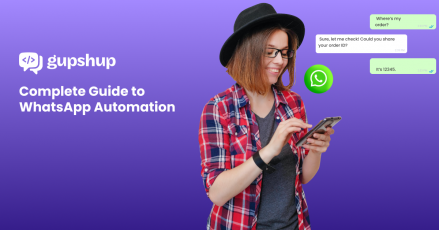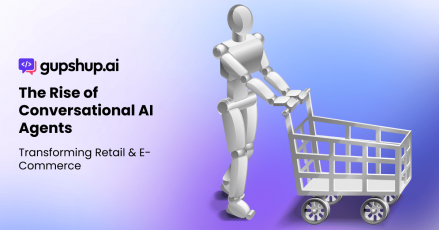Conversational AI in Healthcare: 5 Real-World Use Cases

Integrating conversational AI in healthcare has moved from a luxury to a necessity in delivering effective patient care.
Patients now expect healthcare interactions to be more accessible, convenient, and personalized than ever before. A market study indicates that 66% of people are inclined to use AI-driven home diagnostics and virtual services. And 74% would prefer virtual medical assistance rather than wait for an in-person appointment.
This instant accessibility has raised the bar for healthcare providers, as patients now expect timely responses to their inquiries and a seamless experience when seeking healthcare services.
Conversational AI, in this context, is a blessing, providing solutions for patients and Healthcare Professionals (HCPs). Communication is made swift and easy through omnichannel messaging and conversational AI chatbots.
With common communication channels like the WhatsApp API, healthcare businesses can optimize communication by providing patients with a centralized platform. This platform allows patients to search for doctors, schedule appointments, and receive prescriptions or test results efficiently.
Here are the top five use cases of conversational AI in healthcare.

Top 5 Use Cases of Conversational AI in Healthcare
Among the myriad other use cases of conversational AI in healthcare, here are some of the most significant ones:
1. Public Health Information Dissemination
The COVID-19 pandemic highlighted a critical lesson: misinformation and panic spread faster than infections during healthcare crises. Even in normal times, false health information harms individuals and communities, leading to uninformed decisions.
Educating people about health facts and correcting misinformation places an extra burden on medical professionals. Conversational AI offers a valuable solution by disseminating accurate information efficiently.
Conversational AI chatbots can address common health questions and FAQs through popular messaging channels like WhatsApp, RCS, etc to, promote awareness and provide timely, reliable information.

2. Appointment Scheduling and Management:
Patients often struggle to connect with the right doctor at the right time for an accurate diagnosis. A conversational AI Chatbot can aid by assessing symptoms and urgency, guiding patients to the appropriate healthcare professional swiftly, thus saving time otherwise spent searching manually.
Leveraging an omnichannel messaging platform reduces wait times and expedites treatment by allocating resources efficiently and streamlining appointment scheduling. This consolidated approach spares patients the inconvenience of visiting multiple providers by offering comprehensive solutions in one place.
3. Medical Triage and Symptom Management
Conversational AI in healthcare serves as a valuable tool in medical triage. It often makes better judgments than certified professionals by thoroughly analyzing patient symptoms and medical history. Patients can seamlessly describe their symptoms through WhatsApp messages, and the chatbot can ask relevant questions to gather more information.
Using WhatsApp chatbots for medical triage and symptom management can ensure that critical cases get immediate attention and the resources necessary to manage their problem. By prioritizing cases based on severity, healthcare providers can address urgent cases first. This also means that the patients who are not so serious can seek guidance from the responses of the chatbot and manage their illness effectively, without making unnecessary visits to the healthcare centers.

4. Chronic Disease Management and Medication Adherence
A conversational AI chatbot plays a prime role in assisting patients with chronic illnesses by giving timely medication reminders offering educational resources about their existing conditions and providing tips on how to manage them well.
Healthcare providers can set up automated messaging systems using the WhatsApp API to send medication and test reminders to patients. These reminders can include dosage instructions, refill alerts, and information about potential side effects.
Let’s take a use case:
Consider a scenario where a WhatsApp chatbot provides daily prompts for health monitoring and gathers essential data relating to blood sugar levels or blood pressure readings. The WhatsApp chatbot would send in a reminder to the user every day at a stipulated time and monitor their wellness based on the inputs provided.
Imagine the healthcare provider sending a reminder like this-
“Good morning, Sarah! Don’t forget to check your blood glucose level and enter the results here.”
After receiving the response, the chatbot could answer in the following manner:
“Thanks for the update. We have recorded the response to maintain your file. I shall remind you again after 12 hours. Take care of yourself!”
5. Mental Health Support and Well-being Management
Conversational AI in healthcare is the ultimate source of support in mental health support and well-being management. It is equipped with advanced Natural Language Processing (NLP) capabilities. Healthcare providers can launch a WhatsApp chatbot that acts as a companion and assists individuals in managing their mental health using Cognitive Behavioral Therapy (CBT) techniques.
The chatbot could be designed for daily therapy sessions and it could specifically target symptoms of depression and anxiety. It may be designed to initiate conversations by inquiring about one’s emotional state and provide personalized activities to combat depression and anxiety.
There are times when seeking immediate help from a mental health professional can be a hassle. In such cases, engaging in a conversation with a chatbot can help one seek immediate relief and release anxiety or stress.
Conclusion
Conversational AI in healthcare is all set to revolutionize healthcare delivery, offering unprecedented levels of accessibility, personalization, and efficiency. These intelligent chatbots and virtual assistants will become indispensable parts of patient care, providing round-the-clock support for everything.
With advancements in natural language processing and machine learning, Conversational AI in healthcare will offer more sophisticated interactions, including empathetic responses and personalized treatment recommendations. These advantages make it even more attractive to both providers and consumers.
But its benefits are not just limited to these. Conversational AI in healthcare has more to it.
Since, patients share sensitive data with chatbots, breach of data is a threat that has to be mitigated. This is where Gupshup can help you build a robust ecosystem. Leveraging Gupshup will lead to improved health outcomes for your patients. Not just this, it will free up staff time by automating certain procedures such as scheduling appointments, sending consultation reminders, and collecting customer feedback.
Gupshup has been proven to lower support costs by 42%. Isn’t that a reason big enough to choose Gupshup?
Gupshup’s benefits don’t end here, it also helps in facilitating remote interactions that simplify access to care for patients through the use of images, videos, and audio clips. Get started with transforming your healthcare business with Gupshup today!
Here are some insightful resources that delve into the diverse applications and benefits of conversational AI:




